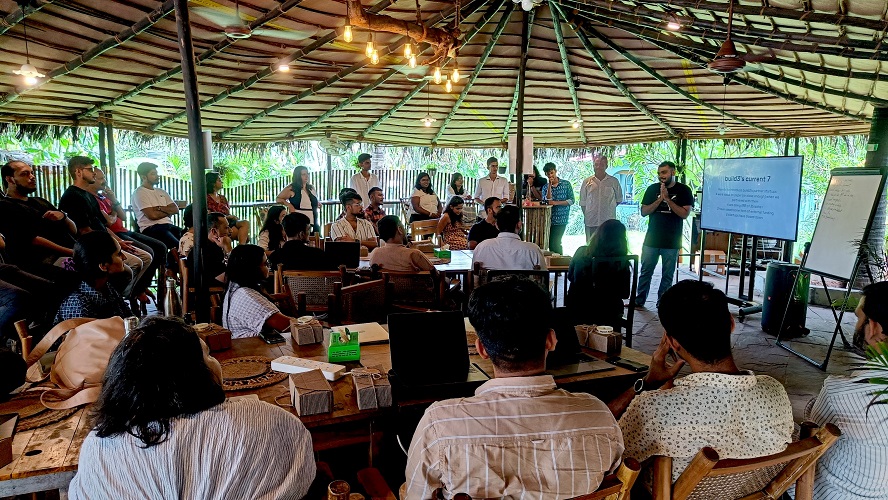Rising Trends in Indian Startups: A Deep Dive into the Tech and Innovation Landscape
Indian startups have been making waves in the tech and innovation landscape, revolutionizing industries and challenging conventional norms. From e-commerce giants like Flipkart to ride-hailing platforms like Ola

Introduction to Indian startups and their impact on the tech industry
Indian startups have been making waves in the tech and innovation landscape, revolutionizing industries and challenging conventional norms. From e-commerce giants like Flipkart to ride-hailing platforms like Ola, these startups have not only transformed the way we shop and travel but also put India on the global entrepreneurial map. With government support, a vast market potential, and an abundance of skilled human resources, Indian startups are flourishing like never before. In this blog post, we will delve deep into the rising trends in Indian startups and explore how they are shaping the future of technology and innovation in this dynamic nation. So buckle up for an exciting journey through the vibrant world of Indian entrepreneurship!
Success stories of Indian startups, such as Flipkart, Ola, and Zomato
Indian startups have been making waves in the tech industry with their innovative ideas and disruptive business models. Among these success stories are some of the biggest names in the Indian startup ecosystem, such as Flipkart, Ola, and Zomato.
Flipkart, often referred to as the "Amazon of India," was founded in 2007 by Sachin Bansal and Binny Bansal. Starting out as an online bookstore, it quickly expanded its product range to become one of India's largest e-commerce platforms. In 2018, Walmart acquired a majority stake in Flipkart for a whopping $16 billion, solidifying its position as a key player in the Indian market.
Ola is another standout success story. Launched in 2011 by Bhavish Aggarwal and Ankit Bhati, Ola revolutionized transportation in India by introducing ride-hailing services through a mobile app. Today, Ola has expanded its services beyond just taxis to include auto-rickshaws and even two-wheelers.
Zomato started off as an online restaurant discovery platform but has since evolved into much more than that. Founded by Deepinder Goyal and Pankaj Chaddah in 2008, Zomato now offers food delivery services across numerous cities not only within India but also internationally.
These success stories highlight the immense potential for growth and innovation within the Indian startup ecosystem. They serve as inspiration for aspiring entrepreneurs looking to make their mark on this rapidly evolving landscape.
The achievements of Flipkart, Ola, and Zomato can be attributed to several factors – visionary leadership, adaptability to changing market conditions , understanding customer needs ,and leveraging technology effectively . These companies have tapped into large market opportunities presented by a growing middle class with increasing disposable income .
Furthermore , favorable government policies aimed at promoting entrepreneurship coupled with investor interest from both domestic and international sources have played crucial roles driving their success .
However, it is important to note that the path to success for Indian startups has not been without its challenges. Competition, changing regulations, and funding constraints are just some of the obstacles that these companies have had to navigate. But their ability to overcome these hurdles and continue to grow and innovate is a testament to their resilience and determination.
In addition to Flipkart, Ola, and Zomato, there are numerous other Indian startups that have made their mark in various industries such as healthcare, education, fintech, and more. These success stories showcase the potential for Indian startups to disrupt traditional industries and drive economic growth in the country. It is clear that the Indian startup ecosystem is vibrant and dynamic, constantly evolving and creating new opportunities for entrepreneurs to thrive.
Key factors contributing to the growth of Indian startups: government support, large market potential, and skilled human resources
One of the key factors that has propelled the growth of Indian startups is the unwavering support from the government. Over the past decade, there have been numerous initiatives and policies implemented to foster innovation and entrepreneurship in India. The introduction of schemes like "Make in India" and "Startup India" has created a conducive environment for startups to thrive.
Additionally, India's vast market potential cannot be overlooked. With a population of over 1.3 billion people, there is a huge consumer base waiting to be tapped into. This presents immense opportunities for startups across various sectors, from e-commerce to healthcare.
Moreover, Indian startups have also benefited from access to skilled human resources. The country boasts a large pool of talented individuals who are eager to contribute their expertise towards building successful ventures. Many young professionals are now opting for careers in startup companies rather than traditional corporate jobs.
Together, these three factors - government support, large market potential, and skilled human resources - have acted as catalysts for the rapid growth of Indian startups. As more entrepreneurs emerge with innovative ideas and bold visions, we can expect this upward trajectory to continue.
Emerging trends in the Indian startup ecosystem: fintech, e-commerce, healthtech, and edtech
The Indian startup ecosystem has been witnessing a surge in various sectors, with fintech, e-commerce, healthtech, and edtech emerging as the frontrunners. These sectors have shown immense potential to disrupt traditional industries and bring about innovative solutions.
Fintech startups are revolutionizing the way financial services are accessed and delivered in India. From digital payments to lending platforms, these companies are bringing convenience and accessibility to millions of people across the country.
E-commerce startups like Flipkart have transformed the retail landscape in India. With increasing internet penetration and smartphone usage, online shopping has become a norm for many Indians. These startups not only offer a wide range of products but also provide quick delivery options and hassle-free returns.
Healthtech startups are leveraging technology to improve healthcare services in India. From telemedicine platforms connecting doctors with patients remotely to AI-driven diagnostic tools, these startups are making quality healthcare accessible even in remote areas.
Edtech startups have witnessed tremendous growth due to the increased demand for online education during the pandemic. These startups offer interactive learning platforms, personalized courses, and skill development programs that cater to diverse educational needs.
These emerging trends highlight how Indian startups are capitalizing on technological advancements and addressing pressing challenges faced by different sectors. By providing innovative solutions and disrupting traditional industries, they are driving economic growth while improving lives.
As we delve deeper into the Indian startup ecosystem, it becomes evident that there is no shortage of opportunities for entrepreneurs willing to take risks and innovate. The convergence of technology with various sectors has opened up new avenues for disruption and growth. With supportive government policies promoting innovation and entrepreneurship coupled with a large market potential and skilled human resources at their disposal, Indian startups continue their journey towards success.
Challenges faced by Indian startups and how they are overcoming them
Challenges faced by Indian startups are inevitable in the fast-paced and competitive business landscape. However, these challenges have only fueled the determination and resilience of these entrepreneurs.
One major obstacle for Indian startups is access to funding. While venture capital investment has been steadily increasing, it can still be a daunting task for early-stage startups to secure sufficient funding. To overcome this challenge, many startups are turning to alternative sources such as angel investors, crowdfunding platforms, and government schemes that provide financial support.
Another key challenge is building a strong customer base in a diverse market like India. Startups need to understand the unique needs and preferences of their target audience across different regions and languages. By leveraging technology and data analytics, companies are now able to tailor their products or services according to specific consumer segments.
Additionally, regulatory hurdles can pose significant challenges for startups in India. Navigating complex government regulations and compliance requirements can be time-consuming and costly. However, with initiatives like Startup India launched by the government, there has been an increased focus on easing regulations for startups through simplified processes and incentives.
Furthermore, attracting top talent remains a constant struggle for Indian startups due to fierce competition from established companies globally. To address this issue, many startup founders are creating innovative work environments that foster creativity and offer attractive compensation packages along with stock options.
Future outlook for Indian Startups
The future outlook for Indian startups is promising and filled with potential. With a growing economy, vast market opportunities, and a supportive ecosystem, the Indian startup scene is poised for continued growth and innovation.
One of the key areas that holds immense promise is artificial intelligence (AI) and machine learning (ML). As technology evolves at an unprecedented pace, Indian startups are leveraging AI to develop innovative solutions across various industries. From healthcare to finance to agriculture, AI-powered startups are making significant strides in transforming traditional sectors.
Another area of focus for Indian startups is sustainability and clean energy. With increasing environmental concerns, there has been a surge in green tech startups that are working towards creating sustainable solutions for a better future. These startups are developing renewable energy sources, waste management systems, and eco-friendly products to address pressing global challenges.
The rise of fintech continues to reshape India's financial landscape. Startups in this sector are disrupting traditional banking models by providing digital payment solutions, lending platforms, investment apps, and more. This trend is expected to gain further momentum as more people embrace digital financial services.
Additionally, the edtech sector has witnessed significant growth with the shift towards online education due to the pandemic. Indian startups have seized this opportunity by offering e-learning platforms that cater to diverse educational needs. This trend is likely to continue as technology becomes increasingly integrated into education delivery methods.
In conclusion, the future looks bright for Indian startups as they continue to innovate across various sectors using cutting-edge technologies like AI and ML while addressing critical issues such as sustainability and financial inclusion through fintech initiatives.











.jpg)



































